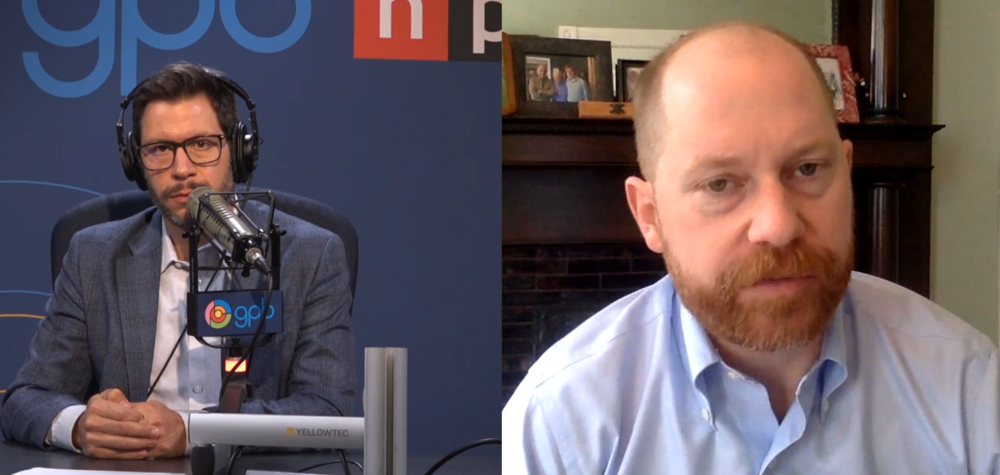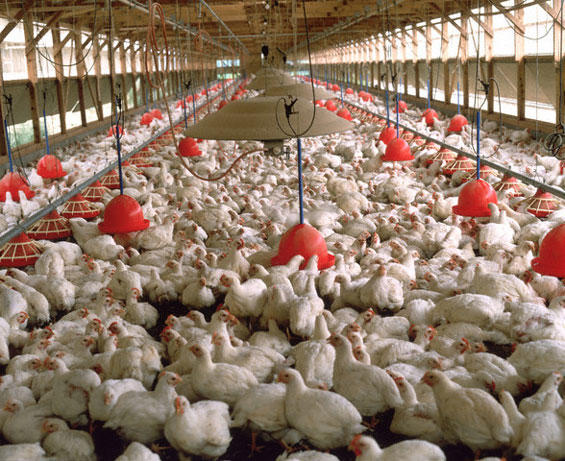
Section Branding
Header Content
Georgia Today: Greene on U.S. Senate race; Teacher recruitment; New Dem. Party Chair Charlie Bailey
Primary Content
On the Wednesday, May 7 edition of Georgia Today: Congresswoman Marjorie Taylor Greene remains noncommittal to a U.S. Senate run; a law designed to recruit teachers doesn't pan out; and the new Chair of the Georgia Democratic Party says health care will be a fundamental issue for his party going forward.

Peter Biello: Welcome to the Georgia Today podcast. Here, we feature the latest reports from the GPB News team. On today's episode, congresswoman Marjorie Taylor Greene considers, but does not commit to, a run for U.S. Senate. A law designed to recruit teachers doesn't pan out. And the new chair of the Democratic Party in Georgia says health care will be a fundamental issue for his party going forward.
Charlie Bailey: That's a choice that Republican leadership has made in this state to not honor and care about everyday Georgians and what they deal with and the fact that they might have to drive two hours to get to an emergency room.
Peter Biello: Today is Wednesday, May 7. I'm Peter Biello, and this is Georgia Today.
Story 1:
Peter Biello: Now that Gov. Brian Kemp has decided not to run for U.S. Senate, potential candidates are weighing their options. GPB's Sarah Callis spoke with one of them, Rome congresswoman Marjorie Taylor Greene, last night. The conservative firebrand remained noncommittal.
Marjorie Taylor Greene: We're really wishing Gov. Kemp well in his future endeavors. He's still our governor, and he's done a great job as our governor. And of course, that's just a choice that I have to make.
Peter Biello: Some Republicans are worried about a potential Greene bid, believing she'd do well in a GOP primary, but not in a general election. Other possible candidates include congressmen Buddy Carter, Mike Collins, and Rich McCormick. Incumbent Democratic U.S. Sen. John Ossoff is running for reelection.

Story 2:
Peter Biello: The Democratic Party of Georgia has a new leader, Charlie Bailey, a former candidate for attorney general and lieutenant governor. Elected with 53% of the vote, Bailey aims to unite the moderate and progressive wings of a party that has not held the majority in the Georgia legislature or the governor's office in more than two decades. Charlie Bailey is with me now to talk about the party's path forward. Welcome to the program.
Charlie Bailey: Thanks for having me, Peter.
Peter Biello: You're planning on trying to unite progressives and moderates in the party. So tell me a little bit about that. How do you plan on going about that?
Charlie Bailey: We're gonna do what I think is foundational to the Democratic Party, which is talk about the issues. The vast majority of people wake up every day and they think about: "Is my kid safe?" "How are they doing in school?" "If I get a hospital bill, can I pay it?" And all of those things have increasing level of anxiety for the people of Georgia because of the Republican leadership of the last 22 years. And at the heart of the Democratic party is, we fight for and protect the dignity of every person and the ability for them to achieve the American Dream. And in this state, that's been made harder by Republican leadership. That's how we're gonna unite, not just Democrats, but independents and others behind a party that is working to get things done for people and not just line the pockets of billionaires and big corporations.
Peter Biello: You mentioned health care, so let me ask you about Medicaid expansion, because that's one thing you've criticized Republicans for preventing — preventing the expansion of Medicaid here in Georgia. How do you plan on accomplishing the expansion of Medicaid as Democrats? Is it simply a numbers game for you, electing as many Democrats as possible? Or is there another strategy you'd like to try?
Charlie Bailey: Well, we're going to have to get more Democrats in the General Assembly because so far, not a sufficient number of Republicans have — have exhibited the courage to do the right thing for the people of Georgia. You know, Peter, you know this: Over the last 12 years, 12 hospitals have closed in our state. And of the 30 rural hospitals that are open today, 18 are at risk of closure. And that is because of a choice. That's a choice that Republican leadership has made in this state to not honor and care about everyday Georgians and what they deal with and the fact that they might have to drive two hours to get to an emergency room. That's a public policy choice. So we're going to have to elect more Democrats.
Peter Biello: You've run two campaigns of your own in Georgia. You've lost both of them. But what lessons have you learned about what it takes for Democrats to win in Georgia based on your personal experience?
Charlie Bailey: And I will just note, I got 49% in 2018 against an incumbent. And in —
Peter Biello: So you came close.
Charlie Bailey: You know, Chris Carr didn't want to give me 49% of the office. So, you know, we came close. And in 2022 had the smallest margin of any Democrat not named Raphael Warnock. I say that to say, I understand how to cut into margins.
Peter Biello: Well, tell me a little bit about how you can cut into those margins. What is the thing you need to do?
Charlie Bailey: It's along the lines of what we've been talking about. You have to draw a clear contrast, and we are going to draw clear contrast with what our priorities are and what the Republicans have done with the power that they have.
Peter Biello: Let me ask you about housing because housing costs are rising across the country, including here in Georgia. Some have accused leaders of "blue cities" elsewhere in the country of making it too hard to build new housing, whether it's, you, know, restrictions or laws or environmental what-have-you. They're accused of this. I'm wondering if you see this happening in Georgia, and if so, what do you think Democrats should do in Georgia going forward to make it easier to build more housing and perhaps lower the cost of it?
Charlie Bailey: I think sometimes politicians — and some Democrats included in this — get in their own way. They forget that setting up barriers and not making government work is an anathema to, again, the whole — the whole point. And so we've got to make sure that, yes, we need to have environmental regulations, obviously. We need to make sure things are built safely and according to the kind of parameters where you want to have safe and healthy communities. But the NIMBYism that goes on — and we're not immune to it — that's not about protecting people's rights, safety or health. That's about trying to design what you want a particular neighborhood to be like and that kind of thing. We have got to be the party of expanding those kinds of opportunities and making it easier to build housing, which includes multi-family housing and condos and that kind of thing. And as you've got greater density, you gotta have that kind of housing so that — we cannot be a state where we've got an increased number of people living in their cars. That requires public policy decisions to be different than they've been.
Peter Biello: Charlie Bailey, new leader of Georgia's Democratic Party. Thank you so much for sharing your thoughts with us. We really do appreciate it.
Charlie Bailey: Thank you, Peter.
Peter Biello: And Charlie Bailey and I also spoke about workers, young voters and the desire to see more of a fight from Democrats in Georgia. And you can find a full video of our conversation at GPB.org/news.
Story 3:
Peter Biello: An inaugural report from Emory University's School of Public Health aims to understand the challenges facing today's kids. GPB's Sofi Gratas has more.
Sofi Gratas: Nearly 1,000 parents were surveyed this year for the State of Child Health and Wellbeing Report across counties and demographics, says researcher Stephen Patrick.
Stephen Patrick: And we asked parents to rank issues that they were worried about.
Sofi Gratas: Across the board, education and school quality was a top concern. But responses varied. White parents had social media use up top, while Hispanic and Black parents were most worried about gun violence. There were some other divides, like in health care use and across rural and urban lines. Patrick said the data is a starting point.
Stephen Patrick: And I think what this is is a call to action for all of us.
Sofi Gratas: And there were through lines in the survey: Only 23% of parents felt confident in school safety, and 91% said they support free or reduced lunch at school. For GPB News, I'm Sofi Gratas.

Story 4:
Peter Biello: A 2022 state law aimed at recruiting teachers out of retirement had minimal effect on Georgia's continuing teacher shortage. That's according to a report published on Monday by the State Department of Audits and Accounts. House Bill 385 allowed retired teachers with 30 years of service to return to the classroom with full pay and pension, provided they sat on the sidelines for one year. The report counted 350 full-time retirees employed, a number substantially smaller than the 6,000 positions it reports as vacant or not fully certified. It says the law's requirements are more restrictive than similar laws in other states. Georgia lawmakers are expected to revisit the initiative before the law expires next summer.
Story 5:
Peter Biello: U.S. Agriculture Secretary Brooke Rollins says federal disaster relief for Georgia farmers hit hard by Hurricane Helene should begin flowing within weeks. Congress approved a $21 billion aid package in December, but that money has been slow in coming. Pressed on the issue yesterday by Georgia U.S. Sen. Jon Ossoff, Rollins said a separate $10 billion emergency commodity assistance program provides an example of fast her agency can move.
Brooke Rollins: We, on March 17, announced it. On March 20, funds were moving out and into farmers' bank accounts.
Jon Ossoff: When will the portal be open for a disaster?
Brooke Rollins: By the end of the month.
Peter Biello: Georgia farmers are facing billions of dollars in losses from the storm. Gov. Brian Kemp is expected to sign a state-level relief package tomorrow.

Story 6:
Peter Biello: A Northeast Georgia community is up in arms about the potential for a new poultry processing plant in town. Food giant Pilgrim's Pride said last week that it would not build a chicken rendering facility in Franklin Springs and would explore locations elsewhere in Georgia. But the city's mayor has vowed to push ahead with a wastewater treatment facility to entice another poultry company. That worries nearby resident [Patty Garrett].
Patty Garrett: I have a grandbaby that was born premature and we have to be really careful with his lungs. Like, he can't get lung infections or whatever. I don't think I'd be able to take him outside to play in my yard if that was going on. And this is a half a mile from a state park, a half-a-mile from a golf course, a quarter-mile from Emanuel University.
Peter Biello: Northeast Georgia is a hot spot for the state's $6 billion poultry industry, but environmental groups have voiced concerns about its effects on air and water. The dust-up over the now-scuttled Pilgrim's Pride facility has put pressure on Franklin County officials to rescind its wastewater agreement with Franklin Springs.
Story 7:
Peter Biello: Atlanta is gearing up to host the FIFA World Cup next year in the city of Decatur, making its own plans for soccer fans to watch the games. GPB's Amanda Andrews has more.
Amanda Andrews: Decatur Watchfest will take place in Decatur Square, broadcasting all 104 World Cup games and offering food, drinks and music for soccer fans. Mayor Patty Garrett says the best part is the 34 days of festivities are all on top of the Decatur MARTA train station.
Donna Bennett: You can be at the official FIFA Fan Fest and matches in downtown Atlanta in less than 15 minutes. You can't drive that fast, let me just tell you.
Amanda Andrews: MARTA will be running additional trains to and from downtown Atlanta after all eight local matches. The World Cup games will begin on June 11, 2026. For GPB News, I'm Amanda Andrews.
Peter Biello: And that is it for Georgia Today. We do appreciate you tuning in. And remember you can find all the latest headlines anytime at GPB.org/news. More news will be coming your way tomorrow and you won't wanna miss any of it. So make sure you subscribe to this podcast and send us your feedback if you have any. The best way to reach us is by email. That email address is GeorgiaToday@GPB.org. I'm Peter Biello. Thanks again for listening. We'll see you tomorrow.
---
For more on these stories and more, go to GPB.org/news
Correction
In this episode, Franklin Springs resident Patty Garrett was incorrectly identified as Donna Bennett. The transcript has been corrected.



